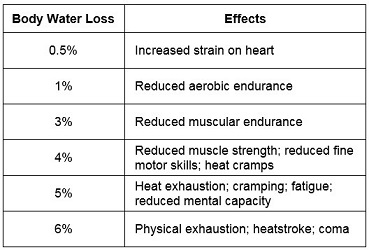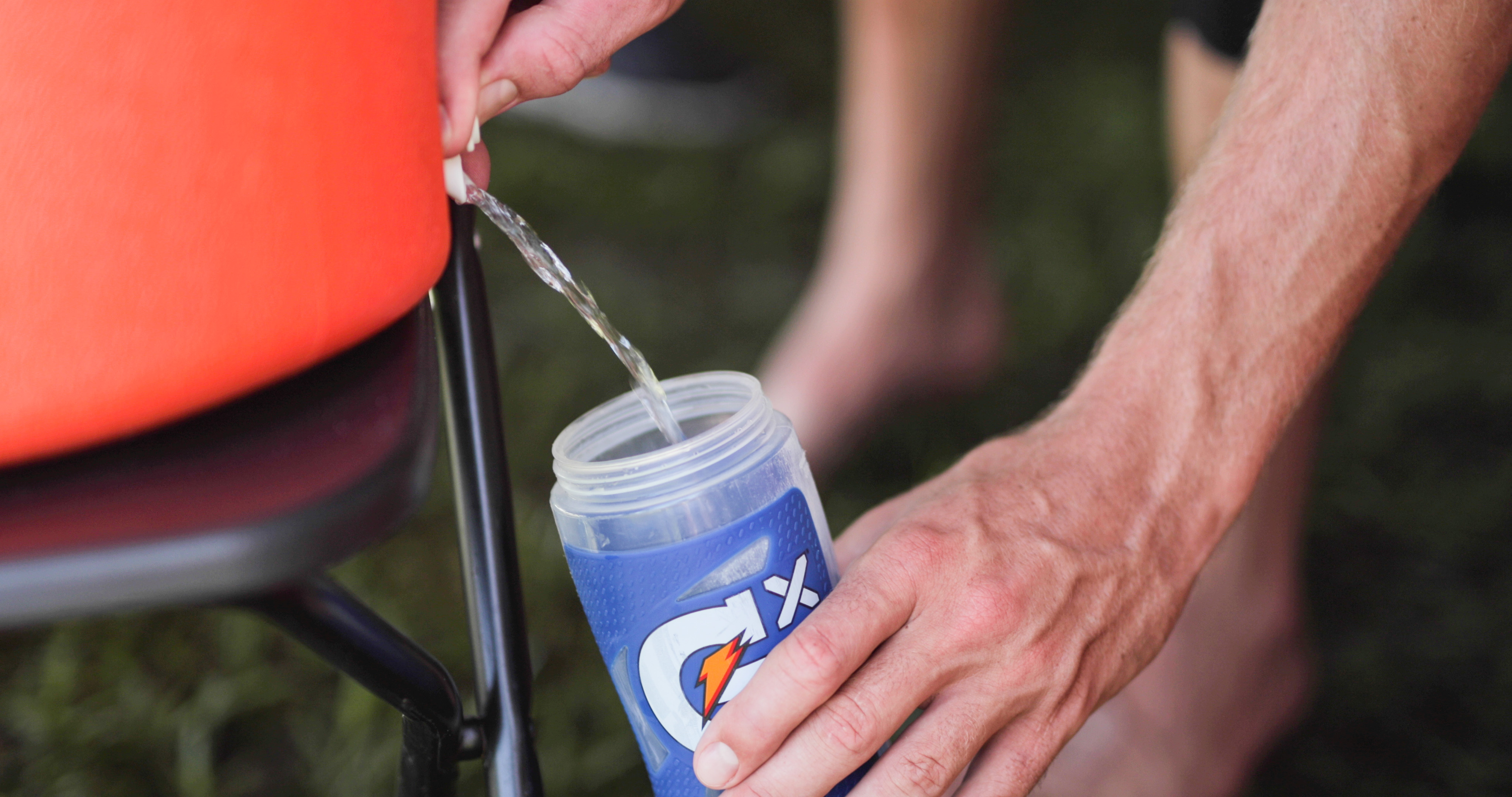Hydration status determines performance outcome! No matter how well you have trained it will not be reflected in your performance if you are not hydrated enough.
Lee Willett explains in detail many aspects of hydration, including:
1. It’s impact on performance
2. How to manage it better
3. It’s impact on your health
In a 2011 article, the UK National Health Service (NHS) wrote “It is recommended that six to eight glasses of water or other fluid are consumed every day to replace normal water loss.” According to the NHS, this equates to around 1.2 litres of fluid. The article added that the human body would need additional fluid in “hotter climates”.
A different type of ‘hotter climate’ is the effect of physical exercise on the human body. Both recreational and competitive athletes will conduct more daily activity than an average person normally will do. In physical exertion, such as that caused by rowing in a boat or on an ergometer, the body heats up as muscles burn energy to generate power and the heart and lungs work faster to transport blood and oxygen. To maintain optimum performance, the body moderates its temperature via heat escaping through the skin in the form of perspiration or sweat – in other words, water.
Recreational and competitive athletes will thus need to replace more water than those conducting everyday, ‘normal’ activities, to maintain both fluid and performance levels.
According to a recent GB Rowing Sports Science team article, while sweating helps the body stay cool during exercise, dehydration will occur “if fluids lost through sweating are not replaced sufficiently”. “Even if you lose as little as two percent of your body weight in fluids, this can impair your ability to cool down and perform to your best.”
What is the effect of hydration on sports performance?
According to one study, losing two percent of body weight through sweat during physical activity causes a noticeable decrease in physical and mental performance, and losing five percent or more can see output capacity reduced by roughly 30 percent.
Hydration affects performance in physical activity by supporting the body’s efforts to maintain optimum temperature while performing at maximum output. Dehydration makes it difficult to achieve such aims.
For this Ludum article, physical activity means athletic performance. Athletic performance is the level of output generated by a skilled individual performing an athletic discipline in training or competition.
Measuring athletic performance through achieving particular objectives over a period of time can relate both to a training programme as a whole, or a specific training session or competition. In this context, it is important for an athlete to understand and practice how to stay hydrated as routine during training but also before, during, and after a particular training session or competition.
Staying hydrated is about striking the right balance between fluid loss and replacement during and around the activity. According to a 2010 Sport Ireland paper on hydration,“Dehydration occurs when fluid loss is not replaced by fluid intake.”
Why is athlete hydration so important?
Maintaining athlete hydration is important because it helps the body to maintain optimum function and the athlete to maintain optimum performance. Water, salts, and other resources that sustain the body are lost through sweat as the body seeks to cool down while maintaining its performance. In the higher output generated in exercise compared to normal daily life, such resources are lost more quickly too.
In terms of what water does to help muscles function as required in athletic performance, it supports their effective function by carrying oxygen to the muscle tissue and by preventing muscles from cramping.
As well as aiding on-the-day performance, effective hydration is also important to longer-term physical output. According to a 2015 World Rowing article, “Proper hydration throughout the day will keep your muscles wet, pliable and less prone to tearing (or other injury).”
Dehydration and athletic performance
The effects of dehydration on athletic performance are varied, ranging from impairing basic functions up to impacting on the ability to perform at a high level of physical, technical, and mental output.
In a 2019 article assessing the effects of hydration on athletic performance, Canada-based organisation Sports Cardiology BC wrote that “Dehydration may cause a reduction in blood volume,decreased skin blood flow, decreased sweat rate, decreased heat dissipation, increased core temperature, and an increased rate of glycogen use.”
Increasing core temperature, for example, can again increase sweating through higher heart rate – with a higher heart rate also contributing to the body performing less efficiently. Alongside impacting physical output, dehydration can reduce mental concentration and reaction time. In competition, mental focus is as critical as physical focus, and reduced concentration can affect technique or adherence to the race plan.
What is heat illness?
Heat illness is caused by excessive heat and insufficient hydration, and its effects range from skin rashes and muscle cramps to heat exhaustion and heat stroke. The American Medical Society for Sports Medicine lists a range of minor, moderate, and severe symptoms, with this spectrum covering swellings, cramps, and dizziness, through excessive sweating and fatigue, to seizures at the most significant end of the scale.
How does dehydration reduce athletic performance?
In simple terms, the effects of dehydration on sports performance intensity can be significant.

(Image credit: PacificHealth Laboratories, Inc.)
How to stay hydrated
An athlete can stay hydrated by maintaining an appropriate, optimal balance between fluid lost in exercise and replacement fluid taken onboard. Staying hydrated is a central element of the wider refueling process for an athlete, a process that includes rest and food as well as fluid.
To stay hydrated, there are ‘before’, ‘during’, and ‘after’ phases.
Should you hydrate before, during, or after exercise?
Before training or competition, the GB sports science team guidelines suggested an athlete should “consume approximately 500 ml of fluid every two to three hours”.
During the activity, “Losses in body mass through sweating should be minimised by drinking little and often.” The article added that, especially in long sessions, reductions of electrolytes such as sodium should be offset by adding a quarter of a teaspoon of table salt per litre of replacement fluid consumed.
After exercise, it suggested athletes offset any bodyweight decrease caused by fluid loss, noting the need to “replace 120-150 percent of the body mass … lost in sweat within the first one to two hours of stopping exercise”, and adding that “One kilogramme of body mass [lost] equates to one litre of fluid.” The article also included a ‘sweat rate calculator’ to help athletes understand fluid replacement requirements.
How much should an athlete drink a day?
According to World Rowing, “As a rule of thumb, athletes should drink two litres per day as a baseline. For each additional hour of rowing exercise an additional litre of fluid should be consumed.” In the case of ‘hotter climates’, where temperatures are increasing significantly, an extra litre should be added per 5°C temperature increase above 25°C.
Are sports drinks a suitable source of hydration?
Sports drinks provide an alternative source of hydration to water when there is a specific need to replace nutrients and minerals, alongside simply replacing fluid. There is enduring debate about the balance between drinking water or sports drinks in replacing lost fluid. The balance point will vary, depending on the sport. For an endurance sport like rowing, its extended training and competition activities can lead to a loss of fluids, nutrients like carbohydrates, and minerals like salt.
In a 2019 British Rowing article, former GB Rowing Team physiologist Craig Williams said “When thinking about recovering from any training session, your first question should be ‘what stress am I trying to recover from?’. If you’ve been on the river for 90 minutes with just water to drink during your outing, then clearly your carbohydrate stores have taken a hit.” “While water will provide some hydration, a simple homemade sports drink would have been better. Squash drinks such as High Juice and salt, added to your water, will go a long way to helping you fuel and hydrate your outing more efficiently,” Williams added.
The Sport Ireland paper noted that “Substantial benefits can result from the inclusion of an oral rehydration sports drink as part of a well-balanced healthy diet.” For example, the paper added, “a properly formulated isotonic energy replacement drink has the dual benefit of simultaneously replenishing both fuel and fluid losses.”
Conclusion
When thinking about how much water to drink a day, a traditional phrase used is to drink ‘little and often’, a hydration guide designed to ensure the body can absorb efficiently the maximum amount of replacement fluid added. Based on World Rowing’s assessment, for an athlete training at least one hour per day the ‘little’ should be at least three litres daily.
View more content like this

Richard Spratley, The Mastermind behind the Oxford Brookes Rowing Empire, chats in Crossy's Corner
Richard Spratley from Oxford Brookes University Boat Club gave us a great interview. Him and Martin discussed some interesting topics, including what it’s like working
Rowing coaching is more than just teaching sport | Rowing coaching tips from Jonathan Males
Richard Spratley from Oxford Brookes University Boat Club gave us a great interview. Him and Martin discussed some interesting topics, including what it’s like working
Coaching through Covid | Round Table - Part 1
Richard Spratley from Oxford Brookes University Boat Club gave us a great interview. Him and Martin discussed some interesting topics, including what it’s like working




